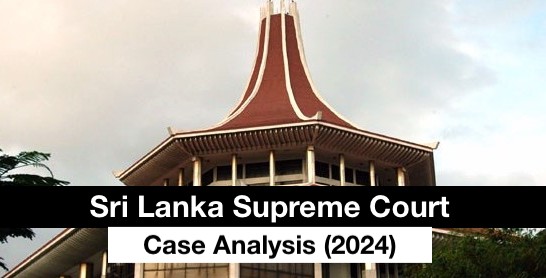Case Overview
The petitioner, Bulugaha Pathirannehelage Sarith Maheeputhra Pathirathne, challenged the Constitutional Council’s decision not to approve the nomination of the President of the Court of Appeal for appointment as a Judge of the Supreme Court. The case alleged violations of fundamental rights under Article 12(1) of the Sri Lankan Constitution (equality before the law). The petitioner argued that the Council’s decision was arbitrary, unreasonable, and irrational, and undermined the judiciary’s independence and the rule of law. Case Reference: SC/FR/35/2024
Key Issues
- Procedural Validity:
- Whether the Constitutional Council followed due process in rejecting the nomination.
- The Council’s reliance on submissions alleging misconduct (bench-fixing tactics).
- Substantive Decision:
- The reasonableness of the Council’s decision under the Wednesbury unreasonableness standard.
- Consideration of the nominee’s conduct and judicial performance.
- Petitioner’s Role:
- Whether the petition was filed in genuine public interest or for collateral motives.
Findings
1. Procedural Validity
- Role of the Constitutional Council:
- Under Article 41C of the Constitution, the Council must approve judicial nominations to protect the judiciary’s independence.
- The Council sought additional information from the Chief Justice on the nominee’s judicial performance, including alleged bench-fixing.
- Fairness in Process:
- The petitioner challenged the Council’s letter to the Chief Justice (P1) as undermining judicial independence.
- However, the court found that obtaining such information was within the Council’s mandate to ensure informed decision-making.
2. Substantive Decision
- Allegations Against the Nominee:
- Serious concerns were raised, including claims of bench-fixing and procedural irregularities in handling cases.
- The Council’s decision was influenced by submissions from the Attorney General and public debates on the nominee’s judicial conduct.
- Wednesbury Standard:
- The court applied the Wednesbury test to assess the Council’s decision-making process.
- It concluded that the Council’s decision was not arbitrary or unreasonable but based on legitimate concerns about the nominee’s suitability.
3. Petitioner’s Role
- Public Interest or Collateral Purpose:
- The petitioner claimed to act in public interest, but the court questioned his motives, citing prior actions to block the Council’s information-gathering efforts.
- The court found the petition lacked bona fides and appeared to be influenced by external interests.
Judgment
The Supreme Court upheld the Constitutional Council’s decision, finding no violation of the petitioner’s fundamental rights under Article 12(1). Key points included:
- The Council acted within its constitutional mandate to protect judicial independence.
- The decision was based on credible evidence and aligned with public interest.
- The petitioner’s lack of good faith undermined the credibility of the application.
Implications
- Judicial Appointments:
- Reinforces the Council’s role in ensuring the judiciary’s integrity and independence.
- Highlights the importance of scrutinizing nominees’ professional conduct and public perception.
- Public Interest Litigation:
- Emphasizes the need for petitioners to act in genuine public interest without ulterior motives.
- Bench-Fixing Allegations:
- Underscores the judiciary’s responsibility to address and prevent practices that could erode public trust.
This analysis concludes that the case sets a precedent for balancing transparency and accountability in judicial appointments while protecting the judiciary’s independence.
Download the Full Judgement














